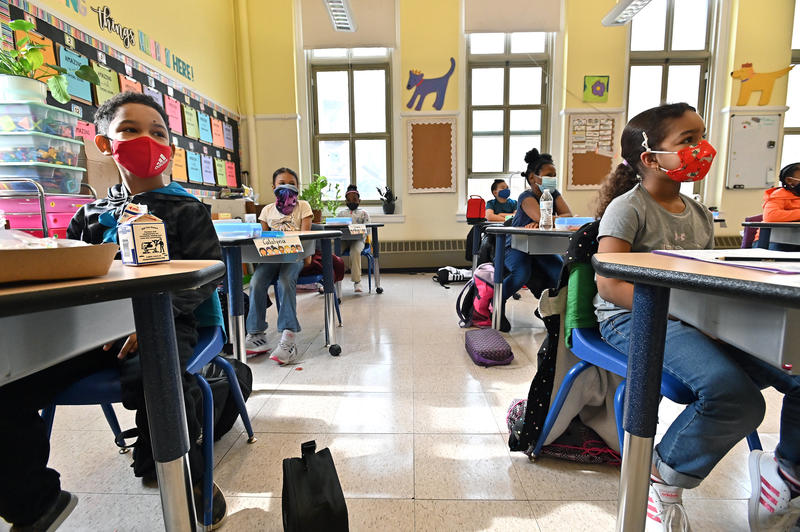FY22 Education Overview
The City of Boston is investing in its students as the key to lifting up future generations of Bostonians.
Between the Boston Public Schools (BPS) and charter schools, public education makes up over 40% of the City’s FY22 budget. $1.295 billion will support the over 52,000 students at BPS, and $247 million will support 11,244 Boston students in charter schools.
Education Budget
The City's investment in public education is a cornerstone of the FY22 budget. The education budget will increase by $66 million over the FY21 appropriation, including Boston's charter school tuition assessment and the Boston Public Schools budget.
In 2020, the City made a historic three-year, $100 million commitment to BPS, over and above standard cost increases. The FY22 BPS budget fulfills the second year of this commitment. While other school districts across the country are facing budget cuts in the wake of the COVID-19 pandemic, strong fiscal planning and stewardship has enabled the City to grow the BPS budget to the largest in its history.
With an infusion of funds from both the City and the federal government, new BPS investments are anchored by the district’s belief that we must:
- Return to school buildings safely,
- Recover from the damage caused by COVID-19, and
- Reimagine what it takes to come back as a stronger district for all students.
The budget is also aligned with ImagineBPS, the district’s five-year strategic plan. New investments will accelerate BPS’s efforts to provide an excellent, equitable education so that every child, in every classroom, in every school can achieve the greatness within them.
Education Budget by Fiscal Year
Nearly 90% of the BPS budget will go into schools or toward direct student services.
Investing in Schools
In FY22, funding directly in schools will increase to $830 million. Combined with another $320 million in school services budgeted centrally - such as transportation, special education, and facilities - total spending in schools will reach $1.15 billion, representing nearly 90% of the BPS budget.
The change in enrollment from FY21 to FY22 represents the largest single-year decrease in enrollment in the last 15 years, driven in part by uncertainty due to COVID-19. To mitigate the impacts of these enrollment declines, the City is investing $18.5 million in school supports, on top of existing soft landings and the Foundation for Quality. This infusion of funds in school budgets will ensure that every school is able to maintain level services and continue supporting their students, regardless of enrollment fluctuations they may face in the coming year.
Direct School Expenses
Direct school expenses make up 64% of the BPS budget.
Investments in COVID-19 Recovery
To support a robust reopening of schools and restart initiatives and projects paused due to the COVID-19 pandemic, the FY22 operating budget includes strategic Return and Recover investments that will directly support students and their families.
To prepare schools for a safe return, the City is investing $1.4 million in building condition and cleanliness with the addition of 20 custodians. With this investment, BPS will not only welcome students to safe, clean, and healthy buildings, but also establish a new expectation for facilities.
BPS’s strategies to ensure a strong recovery and improve outcomes for the district’s neediest students include the expansion of the FY21 investment in social workers and family liaisons. While in FY21, these investments were concentrated in Transformation schools, the FY22 investments will guarantee a family liaison and a full-time social worker/mental health professional in every school:
- Along with federal American Rescue Plan Act (ARPA) funds, the City is investing $10 million in additional social workers and mental health professionals who will provide a coordinated, multi-tiered system of supports to meet the social-emotional needs of students and their families.
- An additional $6.8 million will fund family liaisons who reflect the diversity and speak the languages of the school communities they serve, helping parents and caregivers navigate challenges presented by the COVID-19 pandemic and connecting them to community resources for housing, food, and counseling. 78% of social workers and 98% of family liaisons hired in FY21 were people of color.
Federal Funds Investments
Given the enormous operational and fiscal burdens COVID-19 has placed on schools, state and local governments have looked to the federal government for assistance. Early in the pandemic, BPS received an award of $32.3 million in Elementary and Secondary School Emergency Relief (ESSER I) funds that the district has used to defray the costs of mitigating risks and moving teaching and learning online.
Looking ahead to FY22, BPS will soon receive $123 million in additional Elementary and Secondary School Emergency Relief (ESSER II) funds. A third federal relief package, ARPA, was signed into law in March and will also bring significant new funding for COVID-19 recovery to the district (ESSER III). BPS is expecting a total of $400 million in ESSER funding, which will be spent according to a three-year plan developed with input from students, families, educators, staff, and community members.



